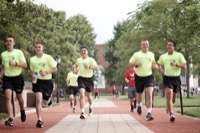
Statistics studies
UD undergraduate Felix Ackon studies statistics, Markov Chains
9:08 a.m., Oct. 28, 2015--When University of Delaware student Felix Ackon received his acceptance letter to UD, the future statistics student was surprised to see that it mentioned the College of Agriculture and Natural Resources (CANR).
“I even showed my mom and she said, ‘College of what?’ We were all surprised,” said Ackon.
People Stories
'Resilience Engineering'
Reviresco June run
Now a junior majoring in statistics in CANR’s Department of Applied Economics and Statistics (APEC), Ackon said that he likes being part of the college and studying at Townsend Hall.
“I like it down here. It’s quiet and calm, a small, more intimate environment,” said Ackon who is also looking to minor in computer science.
Over the summer, Ackon had a chance to participate in the Summer Scholars Program where he was able to conduct research on Biased Shuffling Markov Chains with Nayantara Bhatnagar, assistant professor in the Department of Mathematical Sciences, and Katie Harper, a graduate student.
Markov Chains are models that describe a sequence of possible events in which the probability of each event depends only on the state attained in the previous event. Ackon said that Markov Chains are used for a number of different applications, such as to simulate the stock market or explain certain physical and biological phenomena.
Ackon said that he enjoyed working with his mentors on the project.
“I gained a lot of knowledge from the mentorship I had with Dr. Bhatnagar and Katie Harper. They have been in my situation before so they gave me advice on what classes to take and what I should do in the future, such as graduate school or going into the industry, so I really appreciate them. I got in contact with a lot of other faculty members, too, and they were very friendly people,” said Ackon.
As for his favorite part of statistics, Ackon said that he likes that it is a mathematical field with tangible results.
“I knew I liked math and it was something I wanted to do but when I was researching it, a lot of it seemed too abstract, too conceptual and I wanted to do something that I could apply to my day-to-day life. If I go into the business industry, I could apply it to financial activities or even the economy so that’s why I chose statistics,” said Ackon.
Ackon also said that he likes working with data and enjoys how statistics works with trends that have an impact on everyday life.
“If you think about it, we’ve always had data, even dating back to early civilizations like Egypt. They probably tracked the hours that went by to determine when it would be day and night. Then they did even more advanced calculations to find out what month it was and that progressed into seasons. Using this data, they were able to determine when the Nile flows rapidly or slowly and they needed to do this because agriculture was a big part of their survival. These days, we have a lot of data and we want to use it for our own personal gain. So I think that’s the biggest part, it influences a lot of people,” said Ackon.
Article by Adam Thomas
Photo by Wenbo Fan








